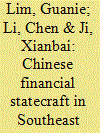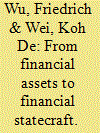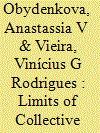|
|
|
Sort Order |
|
|
|
Items / Page
|
|
|
|
|
|
|
| Srl | Item |
| 1 |
ID:
185987


|
|
|
|
|
| Summary/Abstract |
Since 2013, the Belt and Road Initiative has become China’s signature foreign economic policy campaign. While there have been debates on the initiative’s implementation and implications, an emerging consensus suggests that the export of capital-intensive infrastructure is a key driving factor of China’s financial statecraft. For Southeast Asian countries, such Chinese efforts are useful in plugging their domestic infrastructure gaps, not least in the remote parts of their territory. Against this backdrop, this article examines arguably two of the most prominent Chinese infrastructure projects in Malaysia – the East Coast Rail Link (ECRL) and the Malaysia-China Kuantan Industrial Park (MCKIP). It posits three inter-related arguments. Firstly, unlike conventional analyses which commonly treat the Chinese state as a singular, unitary actor, both the central and provincial governments in China’s multi-layer state structure have played important roles and demonstrated different characteristics in Chinese infrastructure overture towards Malaysia. Secondly, one observes contrasting patterns of well-coordinated state-business relations in the ECRL project versus loose, decentralised state-business relations driven largely by Guangxi province and market forces for the MCKIP. Thirdly, the implementation of both the ECRL and the MCKIP has been heavily constrained by the political-institutional environment of Malaysia as the host country, illustrating that Chinese financial statecraft, in the form of infrastructure provision, generates considerably less impact than what popular rhetoric suggests.
|
|
|
|
|
|
|
|
|
|
|
|
|
|
|
|
| 2 |
ID:
133809


|
|
|
|
|
| Publication |
2014.
|
| Summary/Abstract |
Over the past few decades, China has accumulated over US$3.4 trillion of official foreign exchange reserves as it rises to become a global power. Do China's financial assets increase its ability to pursue its national interests internationally? With the globalisation and rising influence of Chinese state-owned enterprises, state-owned banks and sovereign wealth fund, as well as China's growing clout in several regional groupings, it is clear that China does possess the necessary mechanisms to assert its financial power. This article examines the efficacy and limitations of these mechanisms in Africa and Latin America, in the economic and political domains. In the economic domain, China has consistently used foreign oil contracts and acquisitions to secure direct oil flow from developing nations. An analysis of recent cases shows that while China is able to successfully harness its financial power in its pursuit of oil, it needs to fulfil its promises to the satisfaction of the recipient countries in order to maintain the value of its offers. In the political domain, China has used its financial assets to purchase diplomatic allegiance from various African and Latin American countries in support of its One-China policy. Studying both successful and unsuccessful cases reveals that while China is generally able to use its financial power in third-world countries against Taiwan successfully, its national goals have, in recent years, shifted to the economic realm, even with countries that still recognise the Taipei government.
|
|
|
|
|
|
|
|
|
|
|
|
|
|
|
|
| 3 |
ID:
171832


|
|
|
|
|
| Summary/Abstract |
Which limitations does the hegemon face when exerting financial statecraft through multilateral institutions? Recent studies indicate that intergovernmental organizations (IGOs) that are tools of collective financial statecraft sponsored by the United States, like the World Bank and the International Monetary Fund, lead developing states to align with Washington in the United Nations (UN). The same effect is verified in the case of US bilateral aid. Little, however, has been discussed about the effect of American-sponsored regional development banks (RDBs) in the same context. RDBs are IGOs with unique characteristics as each of them covers a region of the world and relies on resources from developed sponsors and developing borrowing members alike. In this article we aim to fill this gap in the debates on economic and financial statecraft by demonstrating through tobit models that the higher the material capabilities of a borrowing state that takes loans, the less likely it is to align with the United States at the UN General Assembly (UNGA). Membership of all RDBs but the European Bank for Reconstruction and Development (EBRD) yields the same effect. Results indicate the need to develop further research on RDBs to assess whether they create incentives for challenging the hegemon.
|
|
|
|
|
|
|
|
|
|
|
|
|
|
|
|
| 4 |
ID:
155577


|
|
|
|
|
| Summary/Abstract |
SAORI N. KATADA, CYNTHIA ROBERTS, and LESLIE ELLIOTT ARMIJO examine the collective financial statecraft initiatives implemented by the BRICS (Brazil, Russia, India, China, and South Africa), five emerging powers important internationally and in their respective regions. They argue that BRICS cooperation has been surprisingly successful thus far.
|
|
|
|
|
|
|
|
|
|
|
|
|
|
|
|
|
|
|
|
|